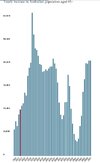Dona Ferentes
Beware of geeks bearing grifts
- Joined
- 11 January 2016
- Posts
- 18,335
- Reactions
- 25,147
Currently, Brazil is home to the largest population of Japanese origin outside Japan, with about 1.5 million Nikkei (日系), term used to refer to Japanese and their descendants.




